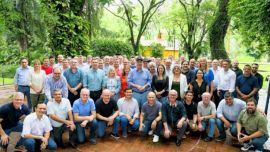President Javier Milei confirmed in a recent interview with TV star Susana Giménez that he will pay a visit to the People’s Republic of China to take part in the Asian nation’s summit with leaders from the Community of Latin American and Caribbean States (CELAC) in early 2025.
This was a defining twist in the Argentine leader’s discourse and position with respect to the Asian giant. Milei admitted that that change in tack started some time ago and he revealed he had a meeting with Chinese Ambassador to Argentina Wang Wei, and that “the following day they unlocked the [currency] swap.”
Milei’s government began by dismissing the Chinese government with controversial statements made during the presidential campaign. He did so from different angles, the tipping-point being when his officials welcomed Taiwan’s representative in Argentina, Miao-Hung Hsie.
Despite those aggressions, in a clear show of Chinese foreign policy avoiding confrontation and developing what the President called a “very interesting link,” Beijing renewed the currency swap, prevented Argentina’s Central Bank from paying US$5 billion to its Chinese counterpart and stretched the disbursement until the middle of next year.
The truth is that ,for some time now, members of Milei’s government’s teams have been forming new lines of approach to China, calling its new relationship with Beijing “pragmatic.” That attitude is clearly grounded on the government’s need for fresh funds for the state’s coffers, and thus negotiations to complete the Néstor Kirchner and Jorge Cepernic dams in Santa Cruz have been refloated, works which could need around US$4 billion in support.
The dams, which when built would be the biggest hydroelectric infrastructure works outside of China, had been agreed during Cristina Fernández de Kirchner’s second term and both throughout Mauricio Macri and Alberto Fernández’s administrations, but for different reasons their construction was halted.
Another project that could also be reactivated is the modernisation of the Belgrano cargo train, with Chinese investment totalling some US$700 million.
The new approach also has to do with the interest of Chinese companies in Argentina's northwest, where they want to exploit lithium mining projects, one of the key sectors targeted by the government’s RIGI investment incentive scheme for large investors.
The growth of China’s role on the international scene has seen it position itself as a key trading partner to many nations – it is Argentina’s second largest in terms of trade.
Despite the uncertainty about the arrival of the libertarian government to power and its refusal to join the BRICS group of nations, exports to China have nevertheless increased by 30 percent this year, which had decreased in 2023 due to the drought.
Yet, on the other hand, imports in 2024 fell by a similar proportion due to an extreme dip in economic activity in Argentina. According to the INDEC national statistics bureau, the relationship with China recorded a deficit of over US$1 billion as of the close of the first semester this year.
During his presidential campaign, Milei stated that “we do not make pacts with communists,” highlighting his libertarian ideological thinking and avowed approach to China. The diplomatic turpitude was heightened in April when Foreign Minister Diana Mondino talked about the Chinese as “all looking alike.”
But little more than nine months into the government, the Milei administration’s latest political and discursive twist shows that ideology often ends up giving way to interests when it comes to governing.
Even those who were most reluctant have finally admitted the importance of global weighty players, as is the case with China.
by Adrian Tuninetti, Perfil



















Comments